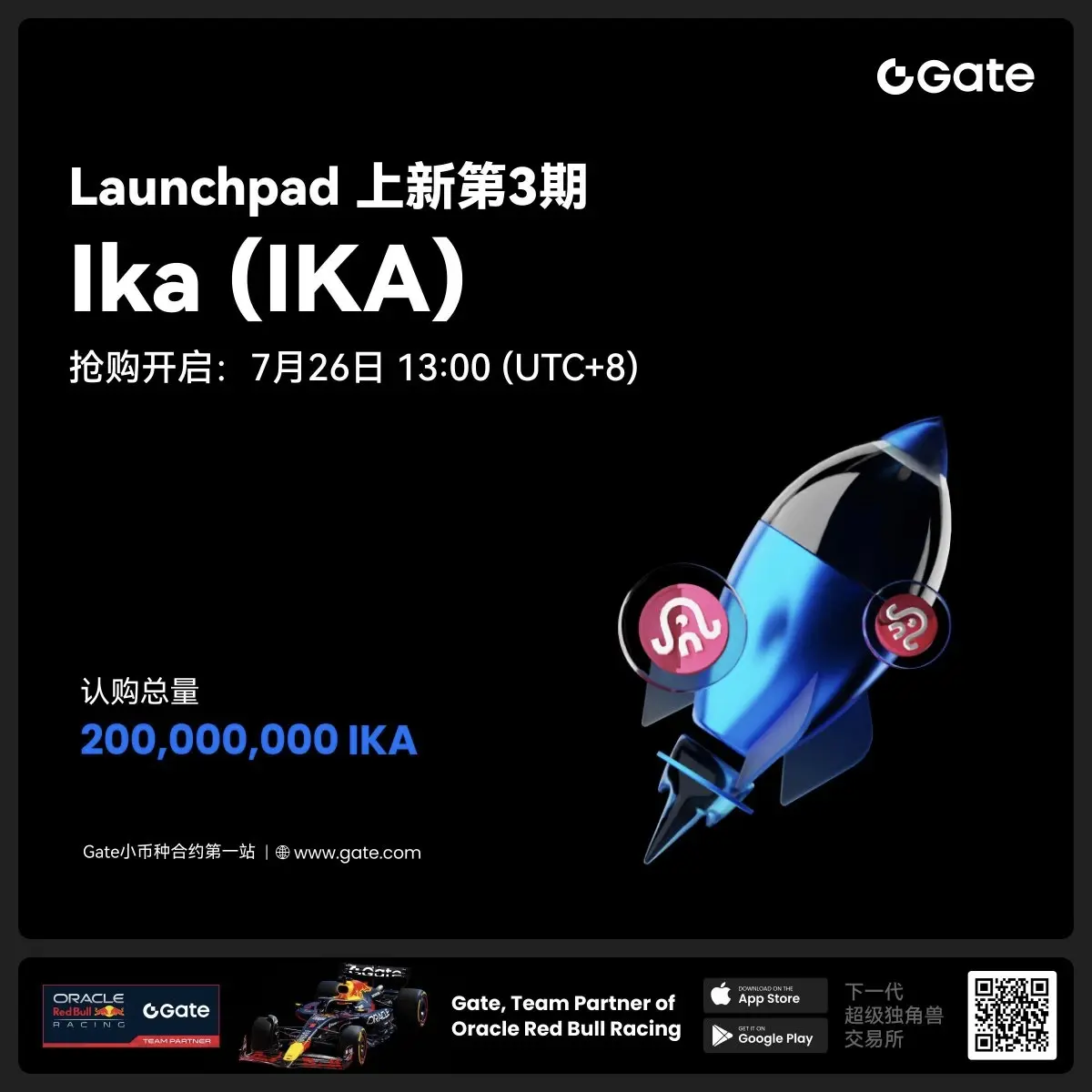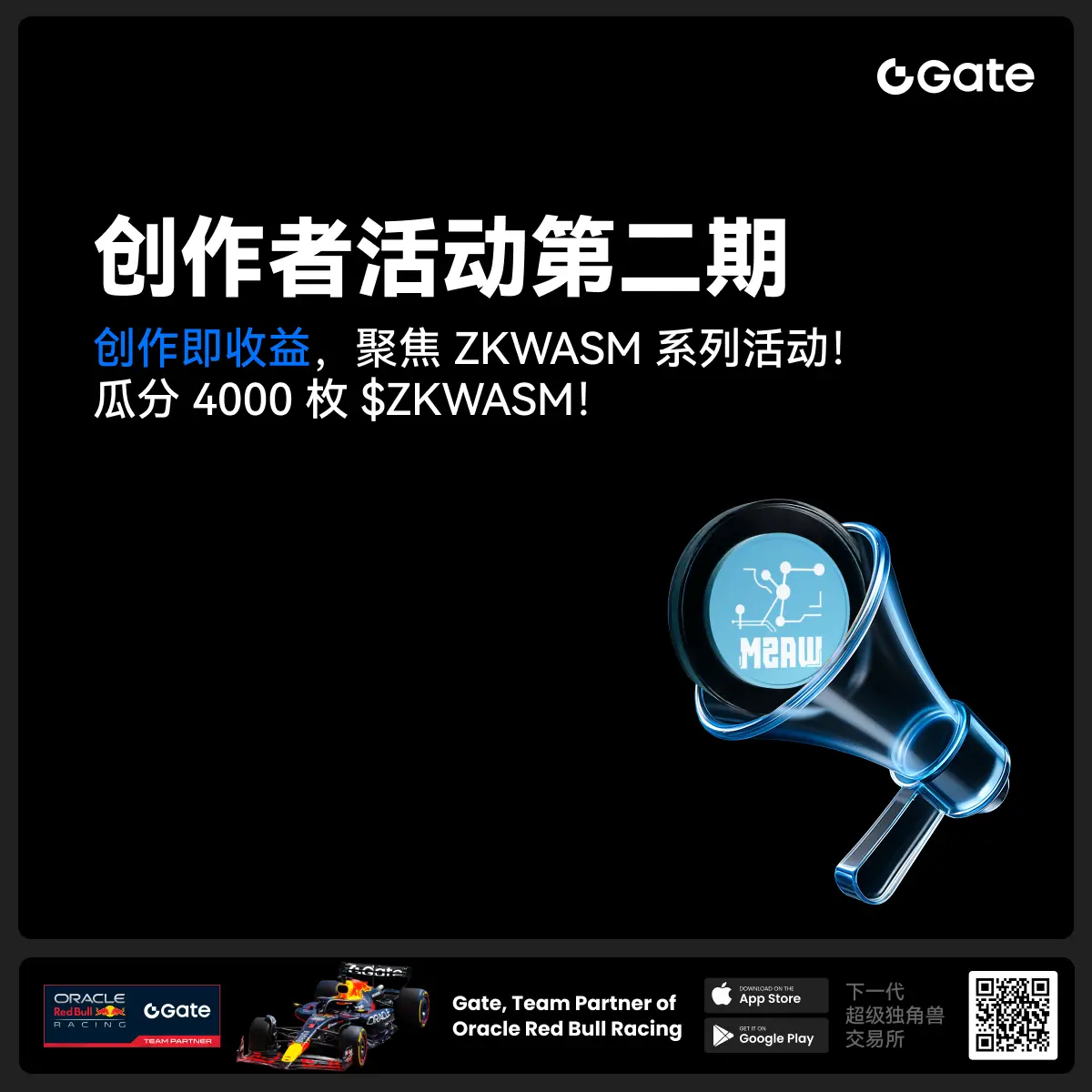- 話題1/3
53753 熱度
12886 熱度
44504 熱度
2269 熱度
2461 熱度
- 置頂
- 親愛的廣場用戶們, #Gate 2025年中社区盛典# 投票中!🔥
🙌 廣場內容達人TOP40榜單新鮮出爐!速速圍觀榜單,爲你喜愛的達人瘋狂打call吧:
www.gate.com/activities/community-vote
每天完成【廣場】互動任務可獲得助力值,每投出30助力值即可參與抽獎一次!
iPhone 16 Pro Max 512G、金牛雕塑、潮流運動套裝、合約體驗券、熱門幣種等你抽!
助力越多,中獎機率越大,下一個抱走iPhone 16的錦鯉就是你!🧧
別猶豫,帶上你的“歐氣”,爲達人衝榜贏大獎!
https://www.gate.com/announcements/article/45974
- 🎉 Gate 廣場 IKA Launchpad 發帖活動來襲!🎉
Gate Launchpad 認購 IKA 最後24小時!曬出你的認購體驗,和大家一起分享,每個人都有機會瓜分 $200 獎池!
🎁 4位幸運分享者*$50合約體驗券每人!
🧐 如何參與:
1.在廣場發帖,帶上 #GateLaunchpad上线IKA# 標籤
2.曬出你的認購截圖 或 分享你的獨特認購小竅門/心得或趣事
3.保證帖子大於50字,內容有趣有料,原創,集齊至少3個互動(點讚/評論/轉發)
IKA認購連結:https://www.gate.com/launchpad/2336?downgarde=true
活動時間:7月28日 12:00 - 7月30日 24:00 (UTC+8)
趕快加入,分享你的精彩時刻,你就是下一個幸運兒!
- 📢 Gate廣場 #创作者活动第二期# 正式開啓!
聚焦 ZKWASM 系列活動,分享你的觀點,瓜分 4,000 枚 $ZKWASM!
ZKWASM 作爲 zk 公鏈先鋒,正在 Gate 平台重磅推廣!
三大活動聯動上線:Launchpool 認購、CandyDrop 空投、Alpha 專屬交易——不要錯過!
🎨 活動一:發布廣場貼文,贏內容獎勵
📅 時間:7月25日 22:00 - 7月29日 22:00(UTC+8)
📌 參與方式:
- 在 Gate 廣場發布與 ZKWASM 或其三大活動相關的原創內容(不少於 100 字)
- 添加標籤: #创作者活动第二期# #ZKWASM#
- 附本人參與 Launchpool/CandyDrop/Alpha 的截圖(如認購、空投或交易)
🏆 獎勵設置:
- 一等獎(1名):1000 枚 $ZKWASM
- 二等獎(2名):500 枚 $ZKWASM
- 三等獎(10名):100 枚 $ZKWASM
📋 評選標準:內容質量、互動量、項目相關性,附活動參與截圖者優先。
📢 活動二:發推贏傳播力獎勵
📌 參與方式:
- 在 X(推特)發布與 ZKWASM 或三大活動相關的原創內容(不少於 100 字)
- 添加標籤: #ZKWASM # GateSquare
- 填寫登記表 👉 https://www.gate.com/quest
- 📢 Gate廣場 #MBG任务挑战# 發帖贏大獎活動火熱開啓!
想要瓜分1,000枚MBG?現在就來參與,展示你的洞察與實操,成爲MBG推廣達人!
💰️ 本期將評選出20位優質發帖用戶,每人可輕鬆獲得50枚MBG!
如何參與:
1️⃣ 調研MBG項目
對MBG的基本面、社區治理、發展目標、代幣經濟模型等方面進行研究,分享你對項目的深度研究。
2️⃣ 參與並分享真實體驗
參與MBG相關活動(包括CandyDrop、Launchpool或現貨交易),並曬出你的參與截圖、收益圖或實用教程。可以是收益展示、簡明易懂的新手攻略、小竅門,也可以是現貨行情點位分析,內容詳實優先。
3️⃣ 鼓勵帶新互動
如果你的帖子吸引到他人參與活動,或者有好友評論“已參與/已交易”,將大幅提升你的獲獎概率!
MBG熱門活動(帖文需附下列活動連結):
Gate第287期Launchpool:MBG — 質押ETH、MBG即可免費瓜分112,500 MBG,每小時領取獎勵!參與攻略見公告:https://www.gate.com/announcements/article/46230
Gate CandyDrop第55期:CandyDrop x MBG — 通過首次交易、交易MBG、邀請好友註冊交易即可分187,500 MBG!參與攻略見公告:https://www.gate.com/announcements
- 📢 #Gate广场征文活动第三期# 正式啓動!
🎮 本期聚焦:Yooldo Games (ESPORTS)
✍️ 分享獨特見解 + 參與互動推廣,若同步參與 Gate 第 286 期 Launchpool、CandyDrop 或 Alpha 活動,即可獲得任意獎勵資格!
💡 內容創作 + 空投參與 = 雙重加分,大獎候選人就是你!
💰總獎池:4,464 枚 $ESPORTS
🏆 一等獎(1名):964 枚
🥈 二等獎(5名):每人 400 枚
🥉 三等獎(10名):每人 150 枚
🚀 參與方式:
在 Gate廣場發布不少於 300 字的原創文章
添加標籤: #Gate广场征文活动第三期#
每篇文章需 ≥3 個互動(點讚 / 評論 / 轉發)
發布參與 Launchpool / CandyDrop / Alpha 任一活動的截圖,作爲獲獎資格憑證
同步轉發至 X(推特)可增加獲獎概率,標籤:#GateSquare 👉 https://www.gate.com/questionnaire/6907
🎯 雙倍獎勵機會:參與第 286 期 Launchpool!
質押 BTC 或 ESPORTS,瓜分 803,571 枚 $ESPORTS,每小時發放
時間:7 月 21 日 20:00 – 7 月 25 日 20:00(UTC+8)
🧠 寫作方向建議:
Yooldo
2025年2月公鏈市場調整:Berachain異軍突起 Base升級顯成效
2025年2月公鏈行業報告:市場調整中的挑戰與創新
2025年2月,區塊鏈市場經歷了顯著調整,對各類公鏈網路構成挑戰。比特幣展現出穩健性,而其他主流鏈則普遍下跌。盡管如此,公鏈領域的開發活動依然活躍,Berachain主網上線、Base基礎設施升級以及Uniswap的Layer解決方案成爲本月焦點。
市場概況
2月市場明顯回調:比特幣從98,768美元跌至84,177美元,跌幅14.8%;以太坊跌幅更大,從3,065美元跌至2,216美元,下跌27.7%。月末最後一周,安全擔憂加劇了拋售壓力。
這次回調緊隨1月的牛市行情,但市場信號復雜,投資者在樂觀情緒與安全隱患擔憂間搖擺。市場情緒惡化,風險偏好降低,尤其是在投機性較強的領域。全球範圍內,北美市場因政策變化表現謹慎樂觀,而亞太市場則更強烈地感受到了安全事件的衝擊。
監管與政策動向
美國政府的加密貨幣行政令聚焦於自托管和穩定幣發展,爲行業提供了政策明確性。然而,2月21日發生的一起重大黑客事件,造成15億美元損失,創下加密貨幣史上最大損失紀錄,引發了新的安全憂慮,市場情緒迅速轉變。同時,監管機構態度有所緩和,暫停了對多家知名加密企業的調查,並放棄了對某些規則的上訴。兩黨支持的穩定幣法案進一步完善了監管框架,顯示美國監管環境趨於友好。
投資者行爲反映了這種動蕩。由某國總統相關代幣推動的熱潮,因負面消息而迅速降溫,估值暴跌,交易量大幅萎縮。這一轉變暗示市場正從高風險資產中撤退。
Layer 1公鏈表現
Layer 1公鏈普遍承壓,市值總額下滑20.8%至2.3萬億美元。比特幣主導地位從71.3%上升至74.2%,而以太坊份額從14.0%萎縮至11.9%。某知名鏈份額小幅上升至3.7%,但另一主流公鏈在價格暴跌36.3%後,份額從4.0%下滑至3.3%。
萊特幣逆勢漲1.0%至128.7美元,而其他主流公鏈如Avalanche則下跌35.7%。
DeFi總鎖倉量(TVL)下降20.0%至829億美元,其中以太坊爲449億美元(下降21.7%),另一主要公鏈爲86億美元(下降34.1%)。
Berachain異軍突起,2月6日主網啓動後迅速躍居第六位,TVL達32億美元。該鏈發行了8,000萬BERA代幣,採用"流動性證明"模型——這是一種創新的質押方式,將流動性轉化爲網路安全。繼2024年大額融資後,本月的空投和治理權益激勵了市場熱情。這種方法可能重新定義公鏈如何平衡增長與穩定性,使Berachain成爲值得關注的項目。
某公鏈的投機性代幣熱潮明顯降溫。高調的失敗案例損害了市場信心,導致相關DEX平台交易量大幅下滑。雖然這類代幣不會消失,可視爲數字收藏品,但其狂熱高峯可能已過,交易者開始更關注基本面而非炒作。
比特幣Layer和側鏈
比特幣L2和側鏈的TVL從27億美元縮減24.5%至21億美元。Core以4.6億美元的TVL領先(下降42.0%),其次是Bitlayer(3.5億美元)和BSquared(3.2億美元)。BOB表現相對較好,僅下跌7.9%至2.2億美元。
中型平台中,Merlin表現較好,TVL小幅下降9.3%至1.5億美元。小型平台面臨更大壓力,SatoshiVM下跌31.5%,MAP Protocol下跌29.6%,Interlay下跌27.4%。
該領域的低迷與業內專家的預測一致,認爲大多數現有比特幣Layer項目將在未來幾年內消失。2月的行業低迷表明整合可能已經開始。未來,那些能證明實際效用的平台可能比僅靠勢頭維持的項目更具持久力。
以太坊Layer
以太坊L2 TVL下降23.4%至140億美元。Arbitrum以45億美元的TVL保持領先(下降33.4%),Base以42億美元的TVL(下降10.6%)升至第二,Optimism(21億美元)降至第三。Polygon zkEVM逆勢漲104.1%至3.0億美元,成爲本月亮點。
Base推出了多項技術升級,包括更快的交易確認、定制化L3和智能錢包子帳戶,旨在提高用戶黏性。Unichain在2月16日主網啓動,此前其測試網已累計處理9,500萬筆交易,定位爲高性能擴容方案,多家知名機構已加入。Starknet的Nums應用鏈作爲Layer 3遊戲創新,展示了模塊化設計的潛力。
同時,雖非以太坊Layer,但Sonic EVM作爲某公鏈的首個SVM鏈擴展,其2月27日Mobius主網上線吸引了大量關注,實現了10,000 TPS,並在短時間內爲某DeFi協議帶來可觀資金。這些舉措表明Layer項目正在深化技術投入。
以太坊創始人在2月19日發表評論,強調以太坊需要在競爭中明確定位。他推動Layer在可擴展性和互操作性方面發揮領導作用,指出它們已從簡單的多重籤名演變爲強大的網路。他呼籲關注真實價值而非投機泡沫,對生態系統中類似賭場的傾向表示不滿。
融資情況
融資活動放緩,2月共完成6筆交易,總額爲3,240萬美元。Mango Network爲其EVM-MoveVM混合鏈籌集了1,350萬美元,計劃在2025年第一季度推出。Fluent Labs獲得了800萬美元融資,用於開發連接以太坊和某公鏈的多虛擬機Layer。